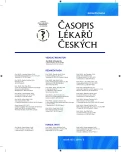Which ethics for medical ethics? Homage to Hans Jonas, 1903–1993
Authors:
prof. MUDr. Marta Munzarová, CSc.
Published in:
Čas. Lék. čes. 2014; 153: 251-254
Category:
Special Articles
Overview
Hans Jonas, one of the greatest philosophers of the 20th century, devoted several studies to the ethics in context with medicine and/or to the new biomedical research. His main thoughts in this field are presented (death and dying, mortality, reflections on experimenting with human subjects – nontherapeutic research, cloning, chimaeras). He was a man of wisdom and his humanity and moral sensibility are a matter of admiration. His ethics is in full consent with ethics and the dignity of medical profession. His ideas are compared (and contrasted) with those of the new bio“ethics“.
Keywords:
Hans Jonas – medical ethics – bioethics
Sources
1. Munzarová M. Zdravotnická etika od A do Z. Praha: Grada Publishing 2005.
2. Callahan D. Judging the future: Whose fault will it be? The Journal of Medicine and Philosophy 2000; 25 : 677–687.
3. Jonsen AR. Why has bioethics become so boring? The Journal of Medicine and Philosophy 2000; 25 : 689–699.
4. Pellegrino ED. Bioethics at century’s turn: can normative ethics be retrieved? The Journal of Medicine and Philosophy 2000; 25 : 655–675.
5. Jonas H. Princip odpovědnosti. Praha: Oikoymenh 1997. (Originál: Das Prinzip Verantwortung. Frankfurt: Suhrkamp 1984.)
6. Jonas H. Philosophical reflections on experimenting with human subjects. Daedalus 1969; 98 : 219–247.
7. Munzarová M. Filozofické úvahy o experimentování s účastí lidských subjektů (podle Hanse Jonase). Prakt. Lék. 2001; 81 : 228–231.
8. Jonas H. The right to die. In: Shannon TA (ed.) Bioethics – basic writings on the key ethical questions that surround the major, modern biological possibilities and problems (third edition). Mahwah, New Jersey: Paulist Press 1987; 195–208.
9. Jonas H. The burden and blessing of mortality. Hastings Center Report 1992 : 34–40.
10. Jonas H. Philosophical Essays: From ancient creed to technological man. Chicago: University of Chicago Press 1980; 155–163.
11. Jonas H. Ethics and biogenetic art. Social research. Autumn 1985; 52 : 491–504.
12. Slabý A, Slabý J. Spor o status lidské osoby v bioetice. Trendy v medicíně 2000; 2 : 107–112.
13. Munzarová M. Stanovisko osob s postižením k bioetice a k lidským právům (aneb Jak učit lékařskou etiku). Prakt. Lék. 2003; 83 : 101–104.
14. Giubilini A., Minerva F. After-birth abortion: why should the baby live? Journal of Medical Ethics. Published Online First 2012; http://jme.bmj.com/content/early/2012/03/01/medethics-2011-100411.full
15. Munzarová M. Proč NE eutanazii. Filosofický časopis 2012; 60 : 403–420.
16. Abbott A. Regulations proposed for animal-human chimaeras. Nature, published online 21 July 2011. http://www.nature.com/news/2011/110721/full/475438a.html
17. Neuhaus RJ. The return of eugenics. Commentary 1988 : 15–26.
18. Neuhaus RJ. The way they were, the way we are. In: When medicine went mad. Bioethics and the Holocaust. Ed. Caplan AL. Totowa, New Jersey: Humana Press 1992; 211–230.
Labels
Addictology Allergology and clinical immunology Angiology Audiology Clinical biochemistry Dermatology & STDs Paediatric gastroenterology Paediatric surgery Paediatric cardiology Paediatric neurology Paediatric ENT Paediatric psychiatry Paediatric rheumatology Diabetology Pharmacy Vascular surgery Pain management Dental HygienistArticle was published in
Journal of Czech Physicians

- Advances in the Treatment of Myasthenia Gravis on the Horizon
- Possibilities of Using Metamizole in the Treatment of Acute Primary Headaches
- Metamizole at a Glance and in Practice – Effective Non-Opioid Analgesic for All Ages
- Metamizole vs. Tramadol in Postoperative Analgesia
- Spasmolytic Effect of Metamizole
-
All articles in this issue
- Perioperative chemotherapy in gastric cancer treatment – the surgeon’s view
- Basic biological roles of galectins in tissue repair and tumor growth
- Calcium, dairy products and weight reduction
- Mutagenic effect of advanced paternal age in neurocardiofaciocutaneous syndrome
- Centres for Tobacco-Dependent in the Czech Republic in 2012: overview and economy
- Which ethics for medical ethics? Homage to Hans Jonas, 1903–1993
- Horizon 2020, new EU Framework programme for research and innovation, 2014–2020
- ESHG Conference – Satellite meeting, MiCo
- DANIEL NATHANS
- Journal of Czech Physicians
- Journal archive
- Current issue
- About the journal
Most read in this issue
- Perioperative chemotherapy in gastric cancer treatment – the surgeon’s view
- Mutagenic effect of advanced paternal age in neurocardiofaciocutaneous syndrome
- Calcium, dairy products and weight reduction
- Basic biological roles of galectins in tissue repair and tumor growth
